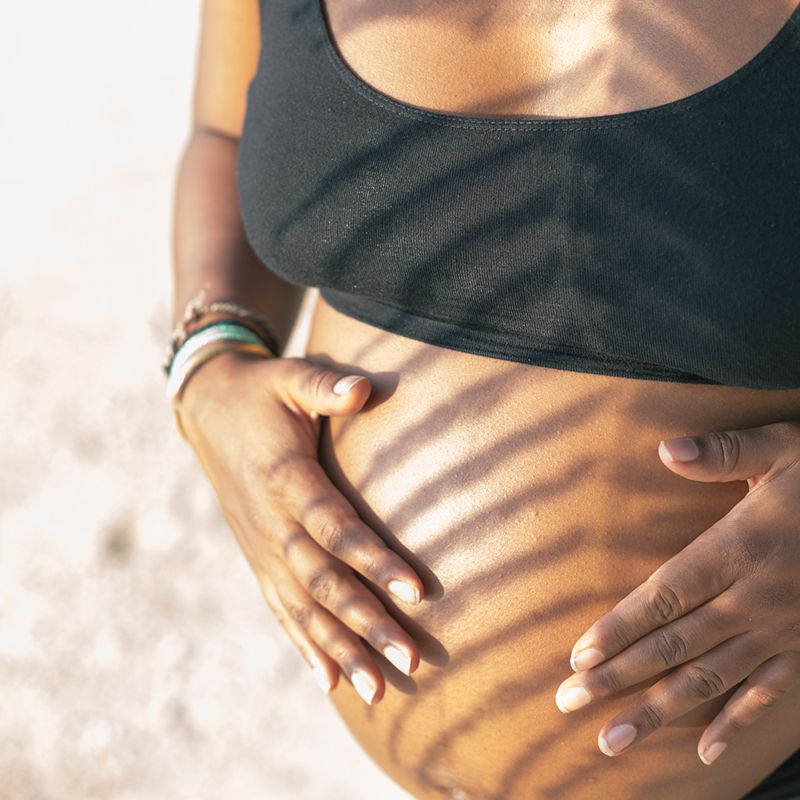6 Fertility Myths OB/GYNs Want You to Stop Believing

There’s a barrage of information about fertility. Depending on who you follow, your social media feeds are probably overflowing with people are struggling to get pregnant, swear a specific practice helped them conceive, or blame a fertility struggle on something they did in the past.
While it’s great we’re talking more about a once-taboo topic (earlier generations were definitely not this open), so much information—and so many different opinions—can lead to a lot of misinformation. That’s why we chatted with OB/GYNs to get to the bottom of the biggest myths of fertility. Here’s what you need to know.
Hormonal Contraceptives Don’t Cause Infertility
A common story around birth control is it may cause infertility. Because of this, many end up blaming fertility struggles on their chosen method of contraception. “One of the most influential factors on fertility is advancing age,” explains OB/GYN Alyssa Dweck, MS, MD, FACOG. “If you have been on one of these hormonal forms of contraception for extended time—like 10-20 years—fertility may end up declining due to age alone. Additionally, many people take these medications for non-contraceptive indications such as severe cramps of endometriosis or irregular or absent cycles due to PCOS. In these cases, the underlying conditions may negatively effect fertility.
Meet the Expert
Alyssa Dweck, MS, MD, FACOG, is a practicing gynecologist in Westchester County, New York. She provides care to women of all ages; she has delivered thousands of babies. A graduate of Barnard College, she has a Masters Degree in Human Nutrition from Columbia University and her Medical Degree from Hahnemann University School of Medicine in Philadelphia, now named Drexel University. Dr. Dweck trained at Lankenau Hospital in Wynnewood, Pennsylvania, where she was Chief Resident in 1994.
You Can Conceive Soon After Going Off Birth Control
While it will take some women a few months before their cycle regulates, this isn’t the case for everyone. “Some people resume their regular cycle immediately upon stopping the pill, and pregnancy can occur. In fact, some have gotten pregnant immediately upon cessation of the pill before even getting their period,” says Dr. Dweck.
You Can Get Pregnant in Your 40s
While there’s no doubt it’s easier to conceive when you’re younger, getting pregnant and carrying a healthy baby to term in your 40s is certainly possible. “Those experiencing perimenopause, (four to eight years of hormonal fluctuation before menopause) can become pregnant and should consider appropriate measures if they want to prevent pregnancy,” says Dr. Dweck.
You Can Conceive Naturally If You Have PCOS
Anywhere from five to 10% of women of childbearing age have Polycystic Ovarian Syndrome (PCOS), making it an incredibly common condition. And a lot of these women are told when and if they want to get pregnant, it probably won’t happen naturally. According to OB/GYN Dr. Mary Jane Minkin, MD and Clinical Professor at Yale University, this isn’t the case. “All gynecologists have anecdotal stories about their patients who have very long cycles related to PCOS who thought they were just under more stress, but actually they were pregnant,” she says.
Lubricant Doesn't Make It Garder to Get Pregnant
While it’s true some lubricants create a hostile environment for sperm, making it more difficult to swim up and meet the egg, a water-based or sperm-friendly lube won’t—and can be just what you need when the stress of trying to conceive can put a damper on your relationship. “Although having sex and making babies should be fun, sometimes having ‘sex on demand’—or timing intercourse with ovulation—can be fairly stressful, and you might not be well-lubricated. Many fertility specialists recommend Pre-Seed, as it is sperm friendly, and we want active sperm greeting the egg,” says Dr. Minkin.
The Foods You Eat Impact the Baby's Sex
If you’re less focused on getting pregnant (or preventing it) and more focused on the sex of the baby, know this: Eating certain foods while trying to conceive will not have an impact on the sex of the baby. “When my daughter, now 32, was born, I joked that my high dairy diet (the fad at the time) was responsible. But I didn’t change my diet at all and my next delivery was my son, so you there go.” says Dr. Minkin.
While social media (and the internet and general) is a great resource, remember: Not everything you read, see, or watch is true. When it comes to anything medical—fertility-related or otherwise—always talk to your doctor.
Here's How Hard It Actually Is to Get Pregnant When You Have PCOS










